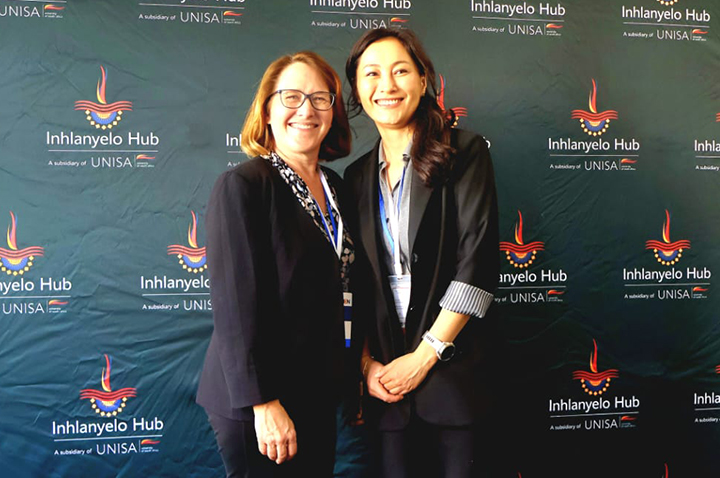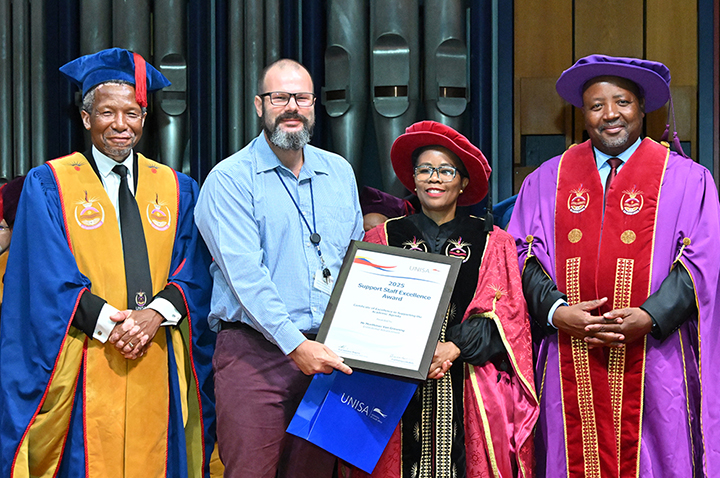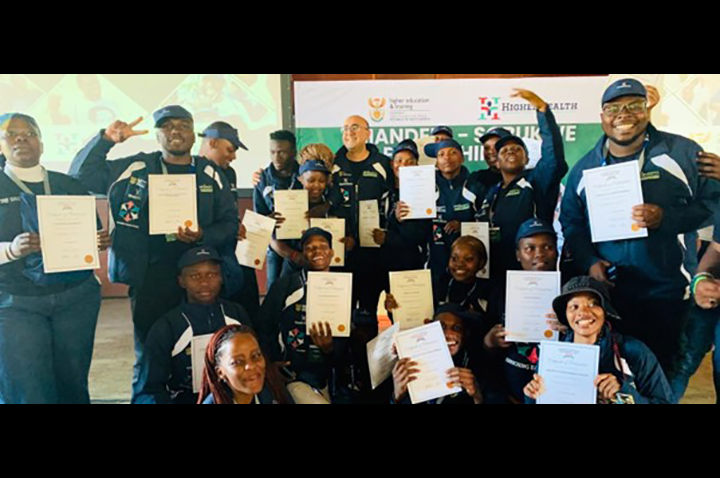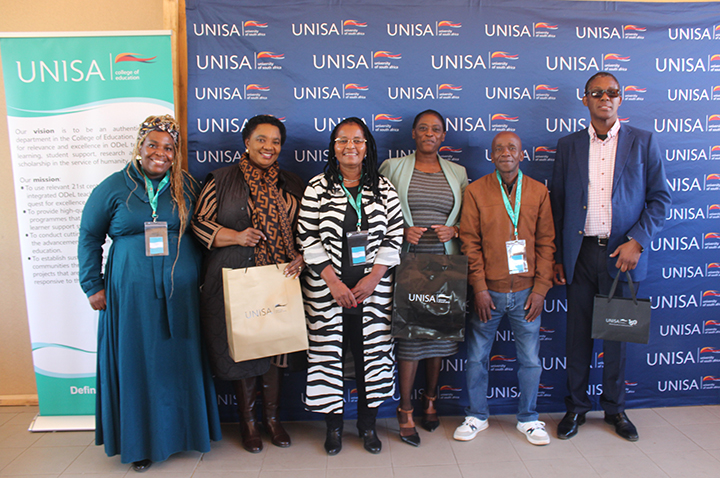
Producing over 40% of teachers in South Africa

Dr Motladi Angeline Setlhako (Acting Manager: Teaching Practice, CEDU) says intensive training is desperately required to train and empower teachers to acquire skills to integrate technology into teaching and learning.
As the world battles to come to terms with the Covid-19 virus, education authorities, policymakers and academics are seriously examining ways of delivering education content that is profoundly different from face-to-face offerings. It is estimated that 850 million children have been shut out of schools as nations use a "lockdown" response to stem the spread of the virus. The shock brought about by the potentially fatal consequences of the coronavirus has forced education authorities to rethink how to educate students at home and who might have to fend for themselves - if they are able.
In South Africa, learning materials have been offered through radio, television and the internet. Online teaching and learning has been touted as one solution to the disruptions that events like Covid-19 can bring to the system. The current offering by the education authorities is an emergency intervention that may prove unsustainable if the current projections on which the lockdown is based have to be revised. Minister of Basic Education Angie Motshekga has made it clear that writing off the academic year is not an option and everything will be done to salvage the year's programmes.
The Covid-19 crisis and the current lockdown can be seen as an opportunity for reflection by authorities, learning institutions and teachers. As a lesson learned: we need not wait for another catastrophic event to fully implement online teaching and learning. The country needs to be proactive. What is required is more than just technological literacy among teachers and students. There should be a greater focus on the integration of technology into teachers’ instructional practices and a review of teacher professional development post-qualification, as well as new approaches and curriculum pre-qualification.
Chinese billionaire Jack Ma states that if we do not change the way we teach, thirty years from now we will be in trouble. We cannot, he argues, teach our kids to compete with machines. Neither can it be business as usual. While the current interventions may provide part-solutions, the nation should be turning to full, integrative online teaching and learning that can withstand the disruptions, pressures and demands of the new tech environment. Teaching and learning can never be the same post Covid-19.
So, how do we thrive in a technological, digital society that requires the rapid development of new skills, and in which our ability to teach and learn will be tested to the hilt? There is the need for the teaching profession to reposition itself to confront the problems of the future through new approaches to both the pre and post-qualification of teachers. There is an urgent need to identify the new skills sets during teaching practice that will equip tomorrow’s teachers to manage the complexities of teaching in the Fourth Industrial Revolution.
Teachers, who can act as potent agents of change, need to develop new competencies and different modes of teaching. New ways of delivering content should be the focus for teachers’ learning, because they are no longer the major source of knowledge nor do they exclusively control and direct the cognitive development of pupils or their learning outcomes. Institutions of higher learning have begun to introduce changes to the traditional methods of teaching and learning through online teaching and learning.
Covid-19 has given the nation a wake-up call. Traditional teaching and learning may no longer be fit for purpose. Rapid technological developments demand new approaches. The Fourth Industrial Revolution (4IR) will bring with it a new world of work, and today’s teachers have to prepare our youth for this world. This means an accelerated programme of professional development for teachers has to be introduced - learning to thrive in a transforming world.
Quality teaching requires quality resources. Change is inevitable, and, if nothing else, Covid-19 has shown us the wide gap in teaching and learning methods that needs to be closed. There is a vast difference between using the internet for learning and using the internet for accessing online learning. The former is accessing existing material based on current curricula, and the latter provides an opportunity to explore, initiate, innovate and interact.
Unisa has established ICT Teacher Centres in rural and remote areas of Kwazulu-Natal, Mpumalanga, North West and Gauteng. The ICT Teacher Centres will be expanded to Limpopo, Eastern Cape, Northern Cape, Western Cape and Free State, in partnership with the Department of Basic Education and Vodacom, which provides the technical support. This, in response to the fact that vast numbers of disadvantaged communities do not have access to technological tools like laptops and IPADS or tablets. These centres are not only open to Unisa-registered students, but are open to surrounding communities for bona fide studies and research. The centres may be effectively used for professional development of teachers and help them to prepare for the future.
It is ironic that China, the country from whence Covid-19 originated, seems to be in the forefront of developing new approaches to teaching and learning. One new generation education start-up - one of many such tech companies in the country - has already enrolled two million student online users, utilising 2 600 learning centres in 700 cities across the country, using "super-teachers" - an official designation given to the most expert teachers in the country - with the full support of government. Other local institutions are also setting up similar infrastructure, but it is still a matter of urgency for business - in their own interests - to support such initiatives. Professional teacher development should be incentivised to ensure buy-in of the teaching profession. Teachers need to be provided with the toolkits of online teaching skills to provide online content and support for students who are often more comfortable with technological devices.
A student in China reportedly declared that he was less distracted at a learning centre than he was in school, and felt at home with the technology. "It’s fun," he reportedly said. "It’s much easier to concentrate on the system because it’s a device." This must be reflective of young students around the world, including South Africa.
The time for artificial intelligence (AI) aligned education has come. AI is adaptive technology and, as such, assists human teachers, if used properly. The fear that human teachers can be replaced by smart machines is a myth. It is important that teachers should be assured that, with new skills, they will still play a frontline role in teaching - they will still play a crucial role in helping students learn diverse skills and still communicate and socialise.
The development of new learner-teacher partnerships, in which the teacher facilitates and guides, rather than teaches, could lead to deeper learning, understanding and appreciation of the subject content in a self-determined learning environment. The revolution in education delivery has exciting possibilities. The quest for new solutions to global challenges, and employment opportunities for jobs that have yet to be invented, should guide our approach to education.
Alvin Toffler, in his prescient 1970 book Future shock, posited that "The illiterate of the 21st century will not be those who cannot read and write, but those who cannot learn, unlearn, and relearn". It is an undeniable fact that teachers hold the key to change and transformation. To keep abreast of the demand for new teaching skills, they urgently need to unlearn, learn and relearn new teaching and/or facilitation skills. It is not enough to provide resources such as computers, tablets and all technological gadgets without the knowledge and ability to operate them. Intensive training is desperately required to train and empower teachers to acquire skills to integrate technology into teaching and learning. The government is faced with a huge task. Although online and e-learning policies are in place, implementation is the daunting task at hand. Developing policies is a second order problem. Education departments worldwide must show their mettle and clearly education in South Africa is yearning for change.
* By Motladi Angie Setlhako, DEd and Manager: Teaching Practice, College of Education
Publish date: 2020-07-08 00:00:00.0
 National leader in mathematics education aims to improve outcomes
National leader in mathematics education aims to improve outcomes
 Unisa roundtable focuses on empowering SA women to lead in innovation
Unisa roundtable focuses on empowering SA women to lead in innovation
 Unisan recognised for web excellence
Unisan recognised for web excellence
 Office of the Dean of Students participates in leadership camp
Office of the Dean of Students participates in leadership camp
 Unisa project fosters digital and pedagogical innovation in Limpopo schools
Unisa project fosters digital and pedagogical innovation in Limpopo schools